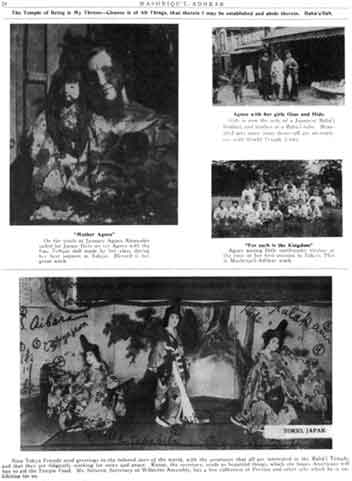
|
Traces That Remain:
A Pictorial History of the Early Days of the Bahá'í Faith among the Japanese
by Barbara R. Sims
edited by Sheridan Sims  |
chapter 17 | start page | single page | chapter 19 |  |
Chapter 18
She and Miss Alexander met in Montclair, New Jersey, in

click here for larger image
Miss Alexander and Auntie Victoria Bedikian in Montclair, New Jersey, 1918.
A page on Japan from one of the early publications, the "Mashriqu'l-Adhkar." The date of this issue was about 1928.
She especially loved children and in 1922 started a "Mashriqu'l-Adhkar" magazine directed toward children —sending it world-wide. It discussed details of the Temple being built in Wilmette, Illinois, and published letters and pictures of groups from different countries. She started a Temple Fund that Bahá'ís could contribute to.
She also started an organization for "destitute" and helpless children. Both 'Abdu'l-Bahá and the Guardian encouraged her efforts on behalf of children. At one time she cared for forty children in her own home.
Auntie Victoria was one of the Bahá'ís who received and sold the Japanese dolls that the Bahá'í class of Tokyo made; Mrs. Kathryn Frankland was another. The proceeds were sent to the Temple Fund. Auntie Victoria often sent small donations, or things like beads, to different countries which she exchanged for decorations native to the countries. She then sold those decorations for the Temple Fund. In addition to dolls, Miss Alexander also sent her Japanese paper, parasols and picture post cards of Japan. The Tokyo Bahá'í class enthusiastically joined in the effort.
Auntie Victoria had a large set of printed deepening sheets for children which she sent out regularly. All the groups, whether in the United States or in foreign countries, which she corresponded with were given names such as "Song Birds," "Violets," "Rose Garden,". and "Divine Pearls." Tokyo was appropriately called "Cherry Garden." Her "gardens" and fellowship groups sent articles and pictures to some of the early magazines. There were one hundred and twenty-nine of her groups in the United States and around the world, and she was always looking for more Bahá'ís to write to. Her extensive and continuing correspondence went a long way in giving the early Bahá'ís a glimpse of the vastness and international aspects of the Faith. Her letters themselves were a deepening, and the recipients felt her love.
 |
chapter 17 | start page | single page | chapter 19 |  |
|
|
